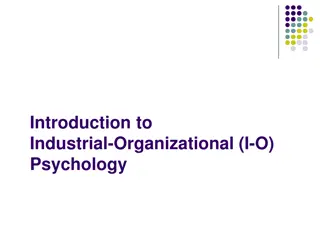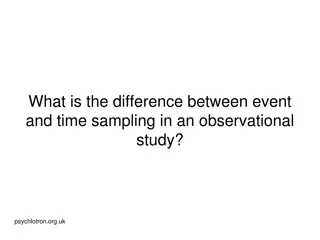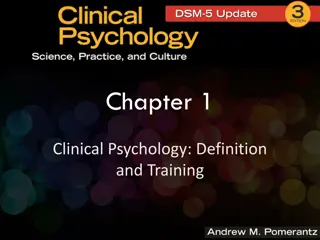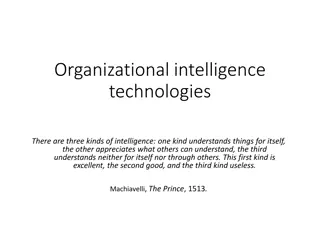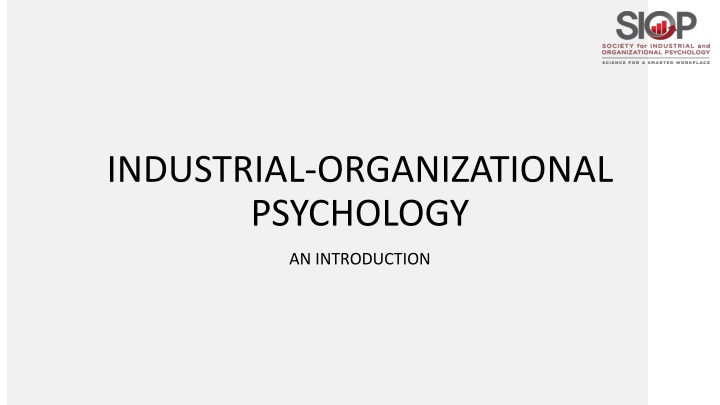
Introduction to Industrial-Organizational Psychology
The field of Industrial-Organizational Psychology explores workplace issues, applies psychological principles to organizations, and studies the changing nature of work. It addresses topics such as job automation, diversity, and work trends.
Download Presentation

Please find below an Image/Link to download the presentation.
The content on the website is provided AS IS for your information and personal use only. It may not be sold, licensed, or shared on other websites without obtaining consent from the author. If you encounter any issues during the download, it is possible that the publisher has removed the file from their server.
You are allowed to download the files provided on this website for personal or commercial use, subject to the condition that they are used lawfully. All files are the property of their respective owners.
The content on the website is provided AS IS for your information and personal use only. It may not be sold, licensed, or shared on other websites without obtaining consent from the author.
E N D
Presentation Transcript
INDUSTRIAL-ORGANIZATIONAL PSYCHOLOGY AN INTRODUCTION
Agenda Explain the overall purpose of I/O Psychology Describe what Industrial Psychology entails Describe what Organizational Psychology entails Discuss SIOP and a career path in I/O Psychology
How many of you Have a job? Have had a job? Want a job?
Work Working is a central part of people s lives around the world Full-time workers in the U.S. work an average of 8.5 hours per day, spending more time working than performing any other life activity except for sleep (Bureau of Labor Statistics, 2016)
Changing World of Work The world of work is constantly changing in many ways, presenting news questions and challenges Advances in technology, changing or eliminating jobs Alternative work arrangements, such as gig jobs (Uber) Diversity and inclusion in the workplace Remote working and successfully dealing with a pandemic How does Industrial-Organizational Psychology play a part?
Artificial intelligence and machine learning Gig economy contract work Diversity, inclusion, and equity Working with big data Automation of jobs and tasks The changing nature of work Top Workplace Trends of 2020 (SIOP) Algorithmic selection validity, bias, and applicant reactions Workforce health and well-being Meaning and purposeful work / Virtual working spaces Data visualization and communication
Industrial-Organizational Psychology the scientific study of working and the application of psychological principles to workplace issues facing individuals, teams, and organizations Trained as scientist-practitioners (can conduct research and engage in the practical application of science) Apply the scientific method to study issues and conduct research about work Apply research findings to the design of organizational, group, and individual activities at work
Industrial-Organizational Psychology Two distinct, related components in the field The Industrial half focuses on the analysis of jobs, the recruitment, selection, and training of employees, and the evaluation of performance in the workplace (sometimes referred to as Personnel Psychology) Research and practice topics include: job analysis, recruitment and selection, performance appraisal, training and development
Job Analysis What tasks the job entails What skills the job requires Where the job fits in the organization How many of you have seen something like this in a job search?
Job Analysis The job description and the knowledge, skills, and abilities (KSA s) required for the job are defined through a job analysis Work-oriented job analysis: focuses on the job itself and involves developing a list of tasks that the job entails - Produces the job description Worker-oriented job analysis: focuses on identifying the qualities needed by a person to successfully perform the job - Produces the KSA s Both involve consultants interviewing current employees and supervisors and surveying these employees to gather information about the job
Recruitment, Selection, and Placement Focused on attracting people to submit applications for open positions within an organization (LinkedIn) Recruitment Process used to evaluate job candidates and decide which ones to hire Selection Placement Placing the candidate in the role and preparing them for success
Personnel Selection One of the oldest topics in I/O psychology Usually involves administering a series of instruments (called predictors) to determine the best applicant I/O psychologists help deliver effective predictors Common predictors include tests of various qualities (intelligence, personality, other traits) and interviews Determine the right set of predictors based on a number of factors (time, cost, legality, validity, reliability, practicality ) General mental ability is the single most effective predictor of job performance Big 5 Conscientiousness said to be an important predictor Interviews? not very effective for evaluating applicants
Worker Performance -Important to evaluate and document employee performance for future decisions (i.e. promotions, training, rewards, termination) Performance Appraisals Structured around the employee s performance of their primary tasks and responsibilities (job analysis) Involves ranking numeric scales corresponding to specific aspects of performance, typically their task performance,and often includes examples/comments of critical incidents Sometimes concerned with additional behaviors (i.e. organizational citizenship behaviors and counterproductive work behaviors)
Industrial-Organizational Psychology The Organizational half focuses on many different levels of workplace phenomena Micro: Individual level (i.e. attitudes and emotions) Meso: Group level (i.e. teamwork, interpersonal discrimination) Macro: Organization level (i.e. leadership, organizational culture) Research and practice topics include: employee attitudes, worker health and safety, motivation, teamwork and leadership
Micro: Individual Level Concerned with attitudes employees hold about their jobs Job Satisfaction: an individual s overall satisfaction with their job Widely studied in I/O and said to have strong links with performance, motivation, and extrarole behaviors (outside job description) Organizational Commitment: an individual s psychological attachment to an organization I/O has identified three types of commitment and a strong link has been found with org. commitment and employee turnover Organizational Justice Theory: employees pay attention to the fairness of how they re treated
Motivation The force that directs employee s behavior at work and has had a long history in I/O psychology Hugo Munsterberg - knitting mills - 12 hour days, 6 days a week Had kittens play with balls of yarn on the factory floor which increased job satisfaction and alertness of employees Goal-Setting Theory (Locke and Latham, 1990) Goals can influence the direction of actions, affect the effort employees put into those actions, increase persistence, and motivate employees to choose more effective strategies in attaining their goals Specifically, if they are SMART goals
Motivation Expectancy Theory (Vroom, 1964) suggests employees are unlikely to be motivated unless they can provide affirmative answers to three questions: 1. Will my effort lead to performance (Instrumentality)? 2. Will my performance be rewarded or recognized (Expectancy)? 3. Will I value the rewards that I will receive (Valence)? Job Characteristics Theory (Hackman and Oldham, 1976) suggests that several key factors of the job influence employee s motivation For example, having autonomy (or freedom to choose how their work is done) has been shown to have a positive effect on employee motivation
Meso: Teamwork In many organizations today, work is often conducted in the context of a group or team Teams are defined as two or more individuals who share one or more common goals Teams are influenced by a variety of social dynamics, and naturally, social psychology is relevant to the study of teams For instance, many people have a tendency to work with less intensity when they are in a group compared to when they work individually (what social psychologists call social loafing)
Macro: Leadership Leaders influence and guide others towards a goal 1920 s and early 1930 s focused on the trait approach Centers on the idea that leaders possess certain traits that non- leaders do not (i.e. ambition, dominance, extroversion, height) However, this research proved to be inconsistent In 1962, Fleishman and Harris defined leadership through two dimensions, consideration (concern for individuals needs) and initiating structure (organizes and defines activities) In modern research, this is now explored as transactional and transformational leadership (Bass, 1985)
Thought Exercise! How do you think I-O psychologists help to inform, improve, or enhance the changes, issues, or concerns at work? Diversity, Inclusion, Equity? Virtual Workspaces? Workforce Health and Well-being? (Top Workplace Trends of 2020)
Diversity, Equity, and Inclusion Recruitment, Selection, and Placement: Discrimination Law Worker Performance Ratings Equity (Job Analysis) Team dynamics Acceptance (inclusion), Culture Leadership Perceptual errors, Culture, Inclusion
Career Paths in I/O Psychology Academia Professor in Business or Psychology Consulting External, Specialist Industry Medium and Large Companies Government NASA, Military, Large Agencies
Interested in Pursuing a Career in I/O Psychology? Over 500 graduate programs in the U.S. that grant master s and doctoral degrees in I/O psychology and options abroad You do not need a doctoral degree to practice, a Master s degree is sufficient to pursue a career in I/O Psychology One of the fastest growing careers Interested? Check out SIOP.org for more information
Thank you for your time! Questions? Presenter s Name Contact Information?





